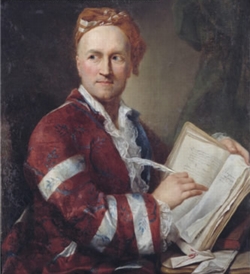 Hugo Grotius is considered a transitional figure in Just War history – transitioning Just War doctrine away from religion. That transition is complete by the time Emmerich de Vattel puts pen to paper. Born in Switzerland (1714), Emmerich de Vattel served as a diplomat for the king of Saxony. In 1758 de Vattel published a handbook for statesmen called Le driot des gens (The Law Of Nations), which argued for Just War “without reference to the theological base that informed Augustine and Aquinas.” (1) Or as one U.S. military chaplain and historian put it…
Hugo Grotius is considered a transitional figure in Just War history – transitioning Just War doctrine away from religion. That transition is complete by the time Emmerich de Vattel puts pen to paper. Born in Switzerland (1714), Emmerich de Vattel served as a diplomat for the king of Saxony. In 1758 de Vattel published a handbook for statesmen called Le driot des gens (The Law Of Nations), which argued for Just War “without reference to the theological base that informed Augustine and Aquinas.” (1) Or as one U.S. military chaplain and historian put it…
In Vattel we find some of the traditional moral attitudes, but now completely stripped of any religious motivation. …Instead of Christian moral principles, Vattel based his theory on what he considered the universal natural rights of self-perfection and self-preservation. Arguing from these rights, he said that every nation has the right to preserve itself and to establish the security of its members by resisting aggressors.(2)
Emmerich de Vattel wrote that every nation had the right to go to war (jus ad bellum). This right, he said, was not subject to a higher authority, for “sovereignty comes from the people as a natural effect of their social organization.” (2) He also limited the way in which wars could be fought (jus ad bello). But unlike previous contributors to Just War thinking, de Vattel limited warfare based on humanitarian “ideals” only and not religious beliefs. Art is an ideal – part of being human – so he condemned the destruction of fine buildings and other cultural treasures.
And like Grotius he believed wars were fought between all citizens of both nations but that not every citizen contributed directly to the war and so should be spared. His list of noncombatants who should not be attacked included clergy, teachers, women, children and the elderly. He forbid the use of hot cannon balls when bombing cities because they could start fires that would unintentionally harm noncombatants.
So, de Vattel defended the right of nations to wage war (jus ad bellum) and expanded the rules of waging war (jus ad bello), but he did so using completely secular reasoning. Christian theology was totally absent from his Just War writings, as they were from John Locke’s – his contemporary who so profoundly influenced America’s founders. Moral considerations were replaced entirely by practical considerations, theology was replaced by “ideals” and “rights.”
Emmerich de Vattel paved the way for modern Just War thinkers. From here on out it is the military and the governments – not the theologians – who author Just War doctrine as it continues to evolve under the influence of pragmatism and not biblical scholarship. War becomes an entirely secular subject.
Sources:
- (1) James Turner Johnson, Ideaology, Reason, and the Limitation of War: Religious and Secular Concepts, 1200-1740 (Princeton, N.J.: Princeton University Press, 1975) 209
- (2) Louis A. Manzo, Morailty in War Fighting and Strategic Bombing in World War II (Air Force Historical Foundation, 1992) 390
 Shaun Groves
Shaun Groves
Zoë says:
I would like to know how come the OT commandment ‘Do not kill’ is ignored, both in the bible and by Christians today. It doesn’t say ‘murder’ it says ‘kill’. And I cannot imagine a situation in which Jesus would kill.
War, like sin, is self-propagating. And all sides lose. http://news.bbc.co.uk/1/hi/programmes/from_our_own_correspondent/9405793.stm
Thank you, Shaun. This was a brave thing to say!
Shaun Groves says:
Here’s the opposing view.
1. The commandment not to kill is specifically revenge killing – you killed our guy so we’re coming to kill one of your guys. It’s preventing the sort of violence that tribes carried out on one another and was not meant for all people in all situations and in all times.
2. It should be translated “murder”, which is instinctively know is different from killing. It implies a certain unsavory motive and doesn’t apply to killing those who deserve to be killed.
3. God wages wars that kill thousands in the Old Testament so there must be exceptions to this rule.
Those are the big three arguments made against your argument…in my experience. Not saying I agree, but you asked ; )
Jonathan Blundell says:
“War becomes an entirely secular subject.”
And yet as of late… Christians are often the first to beat the battle drums 🙁